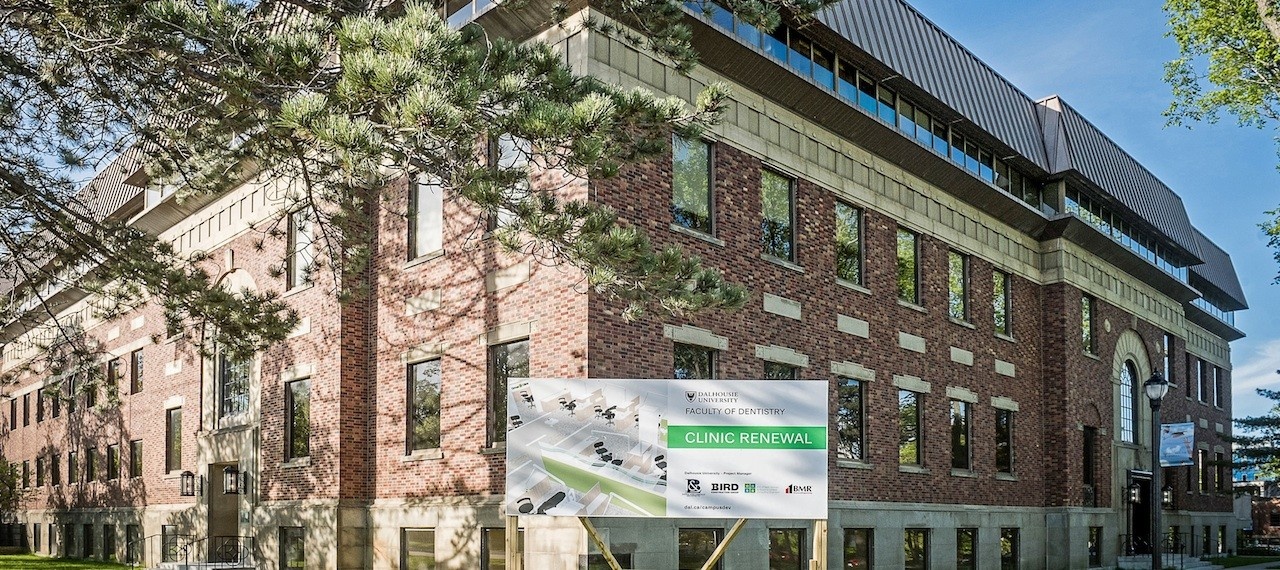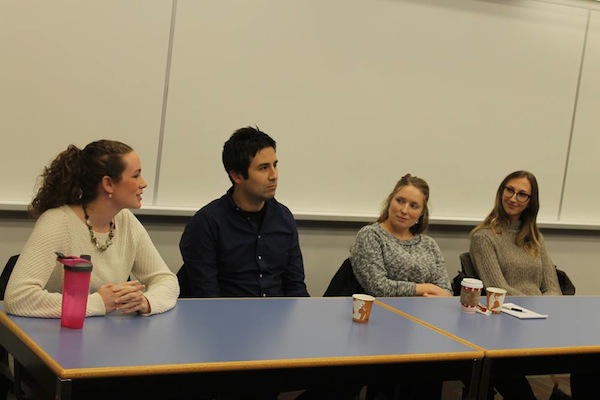News
» Go to news mainWise words from young dentists to new dentists
Drs. Marianne Dobbin, Michael Lo, Sarah Foley, and Kelly Saxby talk to students about real world dentistry
“Do good work, don’t rush, and take time to talk to your patients. If you take care of your patients, the money will take care of itself.” This was just one of the insights for students to come out of the Recent Grads Panel that was held in Aurum Hall on December 2. The panel discussion took place as part of the Dentistry Mentorship Program – a joint initiative of the Faculty of Dentistry and the Nova Scotia Dental Association (NSDA).
When students first begin their dental studies, there is so much to learn and so many skills to master. Just getting through the first couple of years of dental school can feel like challenge enough. But as graduation looms, students’ thoughts turn to the next step: the “real world” that awaits and what it will be like to be working in it.
Four young dentists who graduated from the Faculty of Dentistry in the last five years – Dr. Marianne Dobbin (DDS ’12), Dr. Sarah Foley (DDS ’11), Dr. Michael Lo (DDS ’12), and Dr. Kelly (McDonald) Saxby (DDS ’14) – made up the panel. They fielded questions from moderator Dr. Ahmad Hussein (DDS ’13) and a roomful of DDS3 and DDS4 students who were eager to hear about real world dentistry. In his introduction to the panel, Dr. Hussein called it “a friendly debate from different points of view”.
Four dentists, four different work experiences
The session kicked off with a question to each panelist about his or her immediate post-Dal dental school experience. Dr. Dobbin (who works in Antigonish) spoke about her involvement in organized dentistry as a member of the NSDA governing council. “It’s interesting to see the other side of dentistry and learn about the fee guide and different policies.” She recommended that students consider joining their local dentistry association, not only for the great dinners and networking opportunities, but for the CE points as well.
Dr. Foley took a bold step and bought into a practice six months after graduating. She admits she was “scared to purchase straight away”, but she was able to negotiate with the principal dentist, who really wanted a committed partner rather than an associate who might move on fairly quickly. They came to an arrangement whereby Dr. Foley worked as an associate for six months before committing to the partnership. “I discovered that I had a lot in common with the principal dentist,” says Dr. Foley. “She was a good mentor and we shared a belief in showing compassion to our patients. I decided I wanted to stay. I learned how to do several of the office management jobs, like the inventory and day-end reconciling, which I gradually took responsibility for, and we now have a 50-50 partnership.”
Dr. Lo opted to work part-time in a couple of practices rather than buy into a practice after graduation. “I didn’t want that commitment and responsibility,” he said. Dr. Hussein added that that approach provides a good opportunity to learn about other clinics and figure out what you do want from a clinic for the longer term.
Having recently moved from a practice in Newfoundland to her home turf of Bridgewater/Lunenburg, Dr. Saxby spoke about making that transition, as well as the expectations placed on dentists working in rural areas. “Do your research and make sure you know the specialists you are referring to,” she advised. “If you are working in a rural area, with a long drive to specialists, be aware that patients will expect you to do more. You will be thrown into everything.”
The panelists all spoke highly of the solid clinical experience they received as students in the Faculty. Even so, there were still things they wish they learned or gained more practice in before they left. Dr. Dobbin admits that she was “squeamish” about doing oral extractions as a student, but then wished she had done more when she was out in private practice. “When you’re uncomfortable, that’s when you learn the most,” she said. Similarly, Dr. Hussein advised that students “do upper root canals when you have instructors to back you up. Get comfortable now, because what you don’t learn in dental school will cost you in CE courses”.
When asked about the challenges of private practice, the panelists spoke of the time spent talking to insurance companies, the cost of being a dentist, managing patient expectations, and the struggle to provide ethical treatment to patients with limited finances. Dr. Saxby talked about patients who might have a “small, manageable cavity”, but who opt to have the tooth extracted because that is the cheaper option or because Social Services will pay for the extraction but not the filling. Dr. Foley added that dentistry is very expensive. “People are paying a lot of money for treatment, but things will go wrong. You can’t guarantee the work 100%.”
The importance of communication and managing expectations
“It’s like being a mechanic,” said Dr. Dobbin. “You get your car fixed, but that doesn’t mean it doesn’t need to be fixed again. As dentists, we have to manage expectations and spend the time explaining treatments to patients.”
When it comes time to look for a job, the panelists advised confidence. “Don’t be scared to use your resources,” said Dr. Lo. “It’s easy to get absorbed in school, but try to make time to network and talk to people. Don’t forget that the sales reps are familiar with all the practices and often know who is hiring. Dr. Dobbin admitted that it was her mother who tipped her off to a potential job.
For those who choose to work as associates to start off, the panelists urged caution when it comes to contracts. Because of their debt load when they graduate, many new dentists leap to take the first job that comes along. Take your time, they said, and check things out first. They also advised students to be aware of what the non-competition clause in most contracts means. “Understand what you are reading,” said Dr. Dobbin. You may also need to request a maternity/paternity clause and you should talk about who gets new patients at the practice. Consult with the NSDA about your contract before you agree it, said Dr. Hussein.
The feedback from the Recent Grads Panel was positive, with current students appreciating the insights and honesty of the panelists. Similar events are being planned for the future.
Recent News
- In conversation with Anna Quon
- Start planning for DentDays 2024
- Climb every mountain: Dr. Kevin Walsh enjoys a challenge
- The 2023 QEII Foundation Diversity in Health Care Bursaries: Part of this community
- A whole new ball game in the Faculty of Dentistry
- A donation with great impact
- DentDays dates announced
- 2024 JD McLean Lecture: An interview with Bob Hope

